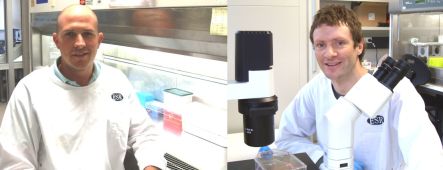Our Changing World for Thursday 12 May 2011
Virus Hunters

Matthew Peacey (left) and Richard Hall (right) in the lab (images: ESR)
It's estimated that every vertebrate species has 20 viruses that are unique to that species. Currently only 1700 vertebrate viruses have been characterised, leaving a huge number of viruses still undiscovered.
Richard Hall and Matthew Peacey are virus hunters. In collaboration with Thomas Briese and other researchers from Columbia University, New York, they're using techniques such as mass-tag PCR, microarray and next generation sequencing, to try and discover new or emerging pathogens in both humans and animals. Working with doctors and veterinarians, this information can potentially be used to help treat the disease, and stop its spread.
To see what's involved in tracking down a virus, Ruth Beran goes to ESR's Clinical Virology Laboratory in Upper Hutt, where the hunt is on for the pathogen causing stomatitis in yellow-eyed penguins.
Climate Futures
The New Zealand Climate Change Research Institute at Victoria University recently organised a conference in Wellington called 'Climate Futures - Pathways for Society'. It was intended as a 'dialogue on our future in a changing climate'. One of the events of the conference was an evening café style session at which four key speakers were invited to talk for 8 minutes, and challenge the audience to think about ways of responding to the reality of climate change, and engaging wider society in the process.
The speakers were well-known theologian and thinker Sir Lloyd Geering, Canadian environmental psychologist Robert Gifford, Canterbury University political scientist and resilience expert Bronwyn Hayward, and Canterbury writer Gareth Renowden, who runs the Hot Topic climate science blog. Alison Ballance recorded the event.
You can listen to all the presentations from the conference online here. Chris Laidlaw featured another discussion from the conference on his Sunday Morning show on Radio New Zealand National.